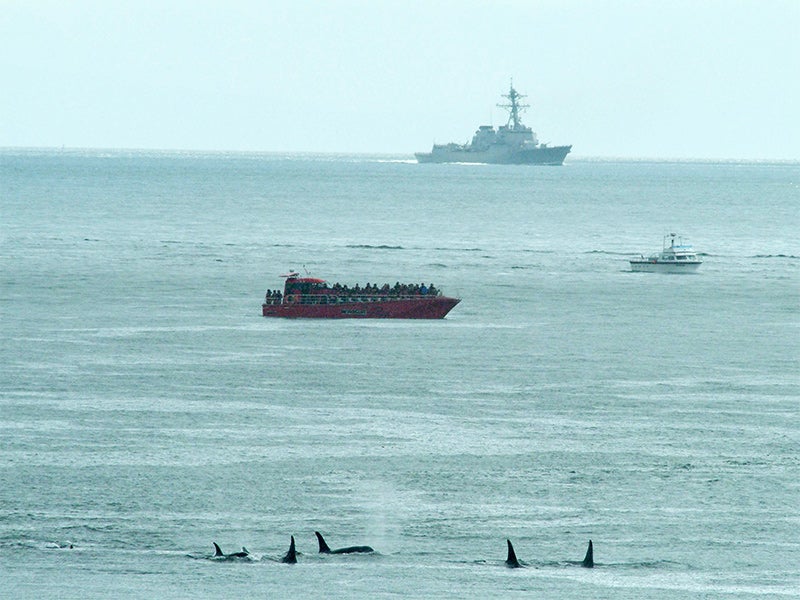Court Rules Navy Training in Pacific Violates Laws Meant to Protect Whales, Sea Turtles
Victory
—Federal judge says Feds wrongly approved plan allowing whales, dolphins, other wildlife to be harmed nearly 10 million times
Contact
A federal judge ruled yesterday that the National Marine Fisheries Service acted illegally in approving U.S. Navy testing and training activities in the Pacific Ocean that threaten widespread harm to whales, dolphins, other marine mammals and imperiled sea turtles.
The Navy and Fisheries Service had concluded that, over the plan’s five-year period, the Navy’s use of explosives and sonar, along with vessel strikes, could result in thousands of animals suffering death, permanent hearing loss or lung injuries. Millions of others could be left with temporary injuries and significant disruptions to feeding, breeding, communicating, resting and other essential behaviors. In all, the Navy’s plan would cause an estimated 9.6 million instances of harm to marine mammals.
The decision of the U.S. District Court for the District of Hawaiʻi results from a December 2013 lawsuit brought by Earthjustice, representing Conservation Council for Hawaiʻi, the Animal Welfare Institute, the Center for Biological Diversity and the Ocean Mammal Institute, which challenged the Fisheries Service’s approval of Navy operations off Hawaiʻi and Southern California as violating the National Environmental Policy Act, Marine Mammal Protection Act and Endangered Species Act.
“The court’s ruling recognizes that, to defend our country, the Navy doesn’t need to train in every square inch of a swath of ocean larger than all 50 united states combined,” said David Henkin, the Earthjustice attorney representing the conservation groups. “The Navy can fulfill its mission and, at the same time, avoid the most severe harm to dolphins, whales and countless other marine animals by simply limiting training and testing in a small number of biologically sensitive areas.”
The National Environmental Policy Act requires that federal agencies, including the Fisheries Service and Navy, consider a range of alternatives, including alternatives that could be pursued with less environmental harm, and that the public have an opportunity to review and comment on that analysis.
The groups sued because the Fisheries Service and the Navy failed to evaluate alternatives that would place biologically important areas off-limits to training and testing.
The judge concluded that the Navy’s claim it needs continuous access to every single square mile of the Pacific, and cannot avoid—even temporarily—biologically important areas where marine mammals breed, nurse their young, and feed, “makes no sense given the size of the ocean area involved.”
Noting the “stunning number of marine mammals” the Navy’s activities threaten with harm, the judge also found the Fisheries Service violated its legal duties under the Endangered Species Act to ensure Navy training would not push endangered whales and turtles to extinction and under the Marine Mammal Protection Act to prevent harm to marine mammal populations.
The judge stated: “Searching the administrative record’s reams of pages for some explanation as to why the Navy’s activities were authorized by the [Fisheries Service], this court feels like the sailor in Samuel Taylor Coleridge’s ‘The Rime of the Ancient Mariner’ who, trapped for days on a ship becalmed in the middle of the ocean, laments, ‘Water, water, every where, Nor any drop to drink.’”
“In 2004, Navy sonar during Rim of the Pacific war games was implicated in a mass stranding of around 200 melon-headed whales in Hanalei Bay on Kauaʻi, with one baby whale dying,” said Marjorie Ziegler, executive director of Conservation Council for Hawaiʻi. “This ruling hopefully will spare other marine mammals from a similar fate.”
“The science is clear that sonar blasts and explosives kill and injure marine mammals and sea turtles,” said Susan Millward, executive director of Animal Welfare Institute. “The court recognized that the law doesn’t allow the Fisheries Service to give the Navy a blank check to harm unlimited numbers of animals. Both agencies must do more to protect these vulnerable animals.”
“The Navy shouldn’t play war games in the most sensitive waters animals use for feeding and breeding,” said Miyoko Sakashita, oceans director at the Center for Biological Diversity. “The Fisheries Service has already identified vital areas to protect for whales and dolphins around the Hawaiian Islands and off Southern California, and they should be off-limits to explosives and other dangerous activities. The federal government has a responsibility to protect our natural heritage as well as national security.”
“This is an important victory for our oceans,” said Marsha Green, president of Ocean Mammal Institute. “The Navy can, and must, find ways to accomplish its mission that reduce the amount of deafening noise that prevents marine mammals from communicating, navigating, feeding and finding mates.”
The effects of navy sonar training on marine mammals
Watch a video with footage from the Center for Whale Research:
BACKGROUND
Ocean mammals depend on hearing for navigation, feeding and reproduction. Scientists have linked military sonar and live-fire activities to mass whale beaching, exploded eardrums and even death. In 2004, during war games near Hawaiʻi, the Navy’s sonar was implicated in a mass stranding of up to 200 melon-headed whales in Hanalei Bay, Kauaʻi.
The Navy and Fisheries Service estimate that, over the plan’s five-year period, training and testing activities will result in thousands of animals suffering permanent hearing loss, lung injuries or death. Millions of animals will be exposed to temporary injuries and disturbances, with many subjected to multiple harmful exposures.

Additional Resources
About Earthjustice
Earthjustice is the premier nonprofit environmental law organization. We wield the power of law and the strength of partnership to protect people's health, to preserve magnificent places and wildlife, to advance clean energy, and to combat climate change. We are here because the earth needs a good lawyer.